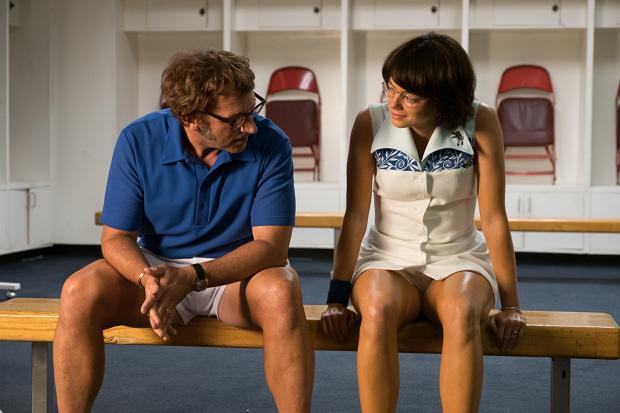Battle of the Sexes
It’s very difficult to think of a sporting event that was simultaneously as bogus and significant as the “Battle of the Sexes.” In fact, you can extend the comparison into public events, generally. Female tennis star Billie Jean King met former, middle-aging champion Bobby Riggs before 30,000 spectators at the Houston Astrodome 44 years ago in a contrived but unprecedentedly popular and controversial match. Riggs had challenged King and other women’s claim to prize money commensurate with what the male players got. If “an old man” could beat a player of King’s caliber, the demand would be exposed as unreasonable.
I’ll confess it only gradually dawned on me then that something of greater significance than tennis was involved: the demeaning of females and the dismissal of their earnest, skilled efforts. As unlikely as it seemed then, this carnival-like event revealed unacknowledged but nasty, damaging attitudes and practices in American society. Jonathan Dayton and Valerie Faris’s movie, Battle of the Sexes, portrays this in vivid, forceful fashion. But Battle doesn’t amount to a pounded-home feminist polemic. It’s vibrantly, propulsively entertaining. Occasionally, it even pauses for a little psychological insight and poignance, but not so much as to retard the fun and action.
Battle jumps right into the fray. King (Emma Stone) and tennis journalist Gladys Heldman (Sarah Silverman) storm into the restricted, paneled sanctum of a New York men’s club to confront tennis great and tournament promoter Jack Kramer (Bill Pullman) after learning he intends to offer the women only one-eighth the prize money the men will get at a West Coast tournament. The unctuously condescending Kramer tells them this is only right because the men are better players and draws. King asks, incredulously, “Eight times better?” When Kramer and other tennis barons refuse to budge, King and Heldman organize a boycott and start an independent women’s tour, and are kicked out of the US Lawn Tennis Association.
Meanwhile, Riggs (Steve Carell) is floundering in desuetude and dissatisfaction, married to a handsome, wealthy woman (Elizabeth Shue), and indulging his gambling jones behind her back. Thrown out by her, and sleeping in a Rolls he’s won from a pal stupid enough to bet against Riggs, it hits him that he can get back into the spotlight by exploiting the gender discord in the sport. He challenges the number-one ranked Margaret Court (Jessica McNamee) and beats the sometimes nervous Australian handily. King sees no way not to accept Riggs’s challenge to her without damaging the new women’s tour.
Tennis is an anomaly among major sports because of its semi-conjoined men’s and women’s wings. A factor Kramer seemed to have overlooked is that in the 1970s men watched the women play, and not just because they wore short skirts. Men still do. There were also other subtleties and ironies that were woven rather imperceptively into the actual story. Riggs was “a clown,” as King calls him at one point, but he had been a tennis outsider from the working class who learned much of his famously twisty, deceptive game as a boy from a female coach. (Some have even called his game “girlish.”) Riggs may have pumped up interest and partisanship before the match with outrageous behavior, insisting he really liked women, if they “were in the kitchen or bedroom,” but he wasn’t quite the biased lout of his public self-portrayal.
It’s been clear for some time that Carell is capable of fine-tuned, perceptive acting, and his Riggs is a spirited, comic, yet sensitive performance. One quizzical look at his disappointed but loving grown son just before the match is quietly striking.
Stone is more than up to the demands of her role, including a storyline about her difficult coming-to-terms with her lesbian nature, even as she’s trying to promote a new tennis tour and deal with the flamboyant Riggs. (Among the difficulties are the suspicions of the homophobic, fundamentalist Christian Court.) The Riggs-King match transcended its circus-hoopla nonsense. If King was right that it posed a real risk to women’s tennis, it was also a window to mean-spirited social ideas. Riggs might have won if he’d prepared seriously, but being defeated by a woman twenty-six years his junior wasn’t the upset people like tennis player Chris Evert seemed to think it to be.
King was never the radical insurgent people of both sexes feared. She just wanted a piece of the action. She was a frank capitalist (“Money is everything in sport,” she once said) and only a moderate feminist, and not much of a gay liberationist, either. Pigheaded people like Kramer engendered her non-radical revolt. And if you think these are only events of the past, consider the much more recent comments of John McEnroe about females’ incapacity to comment on men’s matches.
Battle encapsulates a lot of tennis sturm und drang, and the personalities involved in a bright, intelligently, and very entertaining package.

